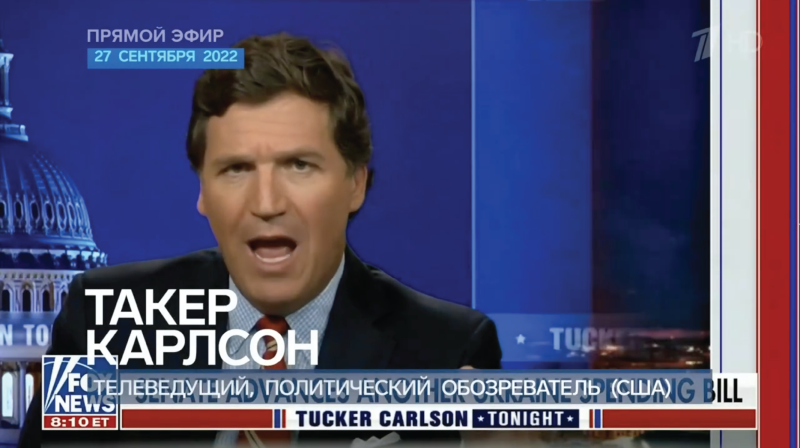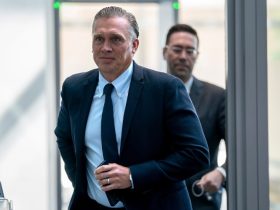Fox News host Tucker Carlson extended an invitation to declared and potential Republican candidates for the party’s 2024 nomination last week: answer a half-dozen questions about Russia’s invasion of Ukraine for coverage on his popular prime-time program. Some Republicans did, including former president Donald Trump, Florida Gov. Ron DeSantis, former New Jersey governor Chris Christie and businessman Vivek Ramaswamy.
The result? Tucker Carlson had a chance to reinforce his view of the conflict to his audience, formalize the acquiescence of at least one leading candidate — and use his platform as a cudgel against those who disagreed.
This was obvious from the first moments of Carlson’s coverage Monday night. (The segment on Ukraine followed more pressing issues: blaming the collapse of Silicon Valley Bank on Democrats and other elites and offering viewers an update on the former Biden administration staffer accused of stealing luggage at airports.) Carlson framed his outreach to the candidates as an essential public service with less than a year remaining before the primaries get underway.
“The voters should know where their candidates stand on the big issues,” Carlson said. “And this is in some ways the biggest issue.” He later added that the war is “arguably the most important topic in the world.”
It is perhaps the most important geopolitical subject in the world. It is hard to see how it might count as the biggest issue in the Republican primary. It is easy to recognize, though, that it’s probably the biggest issue to Carlson.
The Fox News host has distinguished himself both for his insistences that the United States is approaching the conflict in the wrong way and for the extent to which Russian state television has embraced his rhetoric. Even before the expanded Russian invasion of Ukraine a year ago, Carlson disputed the administration’s rhetoric and amplified claims supporting Russia’s position. Within Fox News itself, tension emerged between Carlson and news-side reporters whose understanding of the war differed from the presentation Carlson wanted to make.
Carlson has at least two motivations here. One is that he’s clearly sympathetic to Russia geopolitically, a sentiment he’s expressed overtly in the past. Another is that his default position is that anyone else with power is suspect and that those on the left — or, really, not on the far right — are untrustworthy elites. By going further and repeatedly suggesting that the goal of Democrats and Republicans who support aiding Ukraine is, ultimately, to get U.S. soldiers involved in the conflict is simply a means of raising the stakes.
Republicans responding to Carlson’s leading questions about the conflict, then, had three choices. They could answer Carlson’s questions in a way that catered to him and his audience. They could answer in a way that reflected their actual positions even if it conflicted with Carlson and hope for the best. Or they could not answer at all.
Christie chose the second option — and serves as a good example of how Carlson reshaped the responses he received to fit his agenda.
“Chris Christie is still around and still full of bombast and still a sporty character. In fact, if anything, Christie seemed to become even more orthodox as a neocon,” Carlson said as he presented the former New Jersey governor’s answers. What were those answers? Well, Carlson said, “he calls on the U.S. military to fight and win a war against both Russia and China simultaneously. Otherwise, he warns, Iran and North Korea could take over the world.”
On Twitter, Carlson’s team shared the full responses from each candidate. You be the judge of whether Carlson’s summary is fair:
Does Christie call for a joint war against Russia and China? Does he warn North Korea and Iran will take over the world? No, he warns that American indifference will empower authoritarians, so he suggests that the United States should “assist our democratic allies.” But Carlson doesn’t like this view and clearly doesn’t really like Christie, so he rewrites Christie’s answers.
Carlson had much more luck with DeSantis. Trump’s answers were in keeping with Trump’s past stated positions on the conflict — he could end the war tomorrow using some special “Art of the Deal”-style magic — but DeSantis offered him something new. To Carlson’s glee.
“DeSantis is adamantly opposed to the position that most Republicans in Washington have taken on Ukraine,” he gushed. “DeSantis is not a neocon. Who knew!” He quoted DeSantis’s positions at length, highlighting places where the Florida governor, like him, objected to what Carlson sees as unacceptable orthodoxy. (“DeSantis goes on to oppose the policy of regime change in Moscow, which is very popular in Washington,” Carlson said at one point.)
DeSantis is very familiar with this game of telling potential voters what they want to hear. His most newsworthy statement to Carlson — as Carlson noted in conveying it — was that the invasion was, at heart, a “territorial dispute.” This is very similar language to the description used by Carlson in December 2021, before the war began: “Russia is currently involved in a border dispute with neighboring Ukraine.” No wonder Carlson was so excited.
Carlson called out former U.N. ambassador Nikki Haley for not replying to his questions, telling viewers that she “ignored us.” But Haley made a somewhat clever move, releasing her answers Tuesday morning, giving her both the chance to respond to the responses of her opponents and to offer them in a context that avoided their being summarized by Carlson.
Carlson’s gambit was nonetheless a success. He got DeSantis on the record as broadly supporting his own position on the matter, adding the Florida governor to a list of Republican officials wooed at least in part by the heft of Carlson’s prime-time platform. He got to bash people like Christie as unserious, to dismiss Haley as evasive and to attack former vice president Mike Pence as hostile to his show.
In other words, Carlson got to leverage his position on Fox News to reshape the Republican primary process. He got the two most likely 2024 nominees — Trump and DeSantis — to articulate their fealty to his view of the conflict.
Not helpful to the United States’ established policy on Ukraine, but certainly helpful to Carlson.








